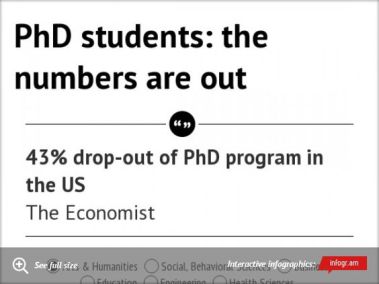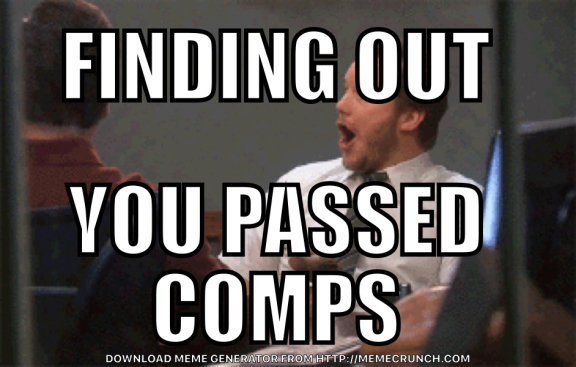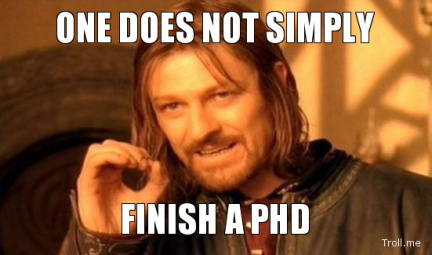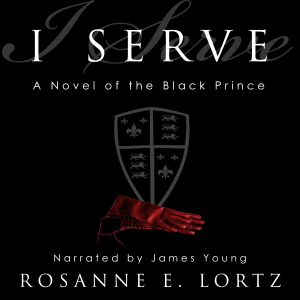
Full disclosure: I have submitted my dissertation and am awaiting the necessary feedback before scheduling my oral defense. Therefore, I have NOT finished my PhD, so my title might be a bit misleading. I have been wanting to post about this for awhile now and feel that I have achieved the necessary level of “done-ness” to finally post about it. Also, Pete Enns has a great blog post about this whole thing. His post should carry a little more clout than mine, considering its source.
First Step: Starting the PhD:
I have been in my program now for 6 years. In that time, I have been asked by several people (mainly my students when serving as their TA), as well as some close friends, if I think they should do a PhD. I have told every single one of them blankly, “No.” I don’t always know each of their situations fully, nor do I know what type of people they have in their life. I just want to offer each person (and will continue to) the chance to hear someone say no to their ambitions. When it came time for me to finish my Master’s programs, I asked many of my advisers for their recommendation letters, etc. and what they thought about my career aspirations. Many of them said, “You’ll be great! This is the right path for you! You have what it takes!” I had one professor in particular (side note: he served as one of my references on all 9 of my applications) who flatly told me, “Don’t do it.”
I was taken aback when he said that to me. Naturally, I was hurt and a little surprised/ worried. I asked him in a panic, “You don’t think I have what it takes? Am I not smart enough? Do you think I’ll fail??” He simply told me, “I will keep telling you no until you have decided you want it. It has to be in spite of people telling you no. You need to have the attitude that you will go forward anyways.” This sentiment has guided me in the ways I have responded to others. Getting a PhD, especially in humanities, is at least a 4-5 year process and is NOT for everyone. In fact, it’s not for most people.
That brings me back to starting a PhD. The simple answer to starting a PhD is making sure you really want it. Like really, really want it. You do not need to be the smartest person in the room (I learned that right away in my program). In fact, some of the smartest people in your PhD program won’t be able to handle the stress and drop out. Did you see that number at the top of this post? 43%. Forty. Three. Be prepared to to at least consider dropping out at one point. You will. Which brings me to my second point…

Step 2: Continuing a PhD:
The simple answer here is “Don’t Give Up!” It’s more complicated than that. There are many blogs on the phenomenon of “Impostor Syndrome.” Basically it’s the idea that you somehow snuck past the admission board’s radar/ qualifications and do not belong among your peers. Honestly, I did not shake mine until about 2 years in. It’s actually a good thing to be surrounded by some of the most astoundingly intelligent people you will ever meet. In my program, I quickly learned that I was going to have to work probably 1.5x harder than them to keep pace. It was a shock, but it also helped me develop very powerful tools in order to continue my program and get to where I am today.
The second part of continuing your PhD is to endure setbacks and surprises. In my program, I have dealt with several surprises and setbacks that in total probably delayed my program for at least 6 months. Things happen. Surprises happen. Issues arise that you were not expecting. You will need to engage your work ethic all the more in these instances. In fact, without going into specifics, the setbacks in my program have actually helped my dissertation topic become much more relevant than it would have been had I finished a year ago. Sometimes it hard to see the forest for the trees. Just keep going!
The final part of Continuing a PhD that I want to cover here is nasty: Comprehensive Exams (“Comps” as they are called at my school–I’ve heard others call them “Quals:” Qualification/ Qualifying Exams). I have finished and submitted my dissertation. It took me 3 full years from proposal to submission. Comps were worse; way worse. They were hands down the hardest part of the program for me. I took the normal time off to study (at Fuller this equates to a full quarter of studying and then about 75% of the next quarter to study before taking the exams at the end; i.e. studying from January until the exams at the end of May). I had to read and remember about 150 books for my exams. Seriously. It was horrible, awful, trying, and overall nasty. If you are in the early stages of a PhD program, get started now on some of your comps studying, assuming of course you have the extra time. The sooner you get through those exams, the sooner you can fully focus on your dissertation topic. Also, make sure to choose varied areas of study if you have any say in what topics your exams will cover. I had complete freedom to choose the topics, but I realize that others don’t.

Step 3: Finishing your PhD:
This part might seem less complete, but that is because I am not completely finished. I want to really talk here specifically about finishing your dissertation. As I mentioned above, mine took 3+ years from proposal (July 2014) to submission (October 2017). My wife and I had our daughter in 2015, and I was a stay-at-home dad from Aug. 2015-Spring 2016. It was amazing, and I do not for one second regret the time I took off for that role. I mention it here to note that if you are just charging through your program (or maybe you have a topic in mind from the get-go), it will probably not take you 3 years to do your dissertation.
Regardless of how long yours takes, I would bet that as you get closer and closer to finishing it, you’ll find some laziness, lack of work ethic, or just general disinterest creeping in. I certainly did. Once you are at the editing phase, it’s easy to fall into the trap of “I’m almost done;” or “It’s just a few days of editing left, I’ve earned a few days off.” Fight through this. Remember: after you submit you can take days off. Full disclosure: I probably could have submitted mine in late August or early September if I had just pushed through these 50% “on” days. It’s hard to quantify, but I think I hit the wall there at the end. If you find yourself in that stage, just keep going. You’re so close and you can take your “well-earned days off” after you submit. It’s just around the corner.
To close this post, I just want to say that everyone is different. You will likely think the things I struggled with in my program are trivial or small matters. Maybe you’re struggling with other things such as funding, support, or adviser issues. If so, reach out to someone you can trust. Make sure you have people you can count on that are outside of your committee members, especially if your problems concern one or more of those members. Also, find at least one other PhD student you can talk to honestly about the program. We’ve all had struggles. Even if that person doesn’t struggle with the things you do, chances are he or she has other problems to discuss with you. This PhD thing is a process and we ought to help each other through it.
If you have questions for me, drop them in the comment box below. I’d be happy to answer them as I am able. If you’re thinking of pursuing a PhD program, talk to someone about it. But make sure that he or she is honest with you; i.e. that they will tell you to not do it unless you’re really sure it’s what you want.
Advertisements Share this:- More






